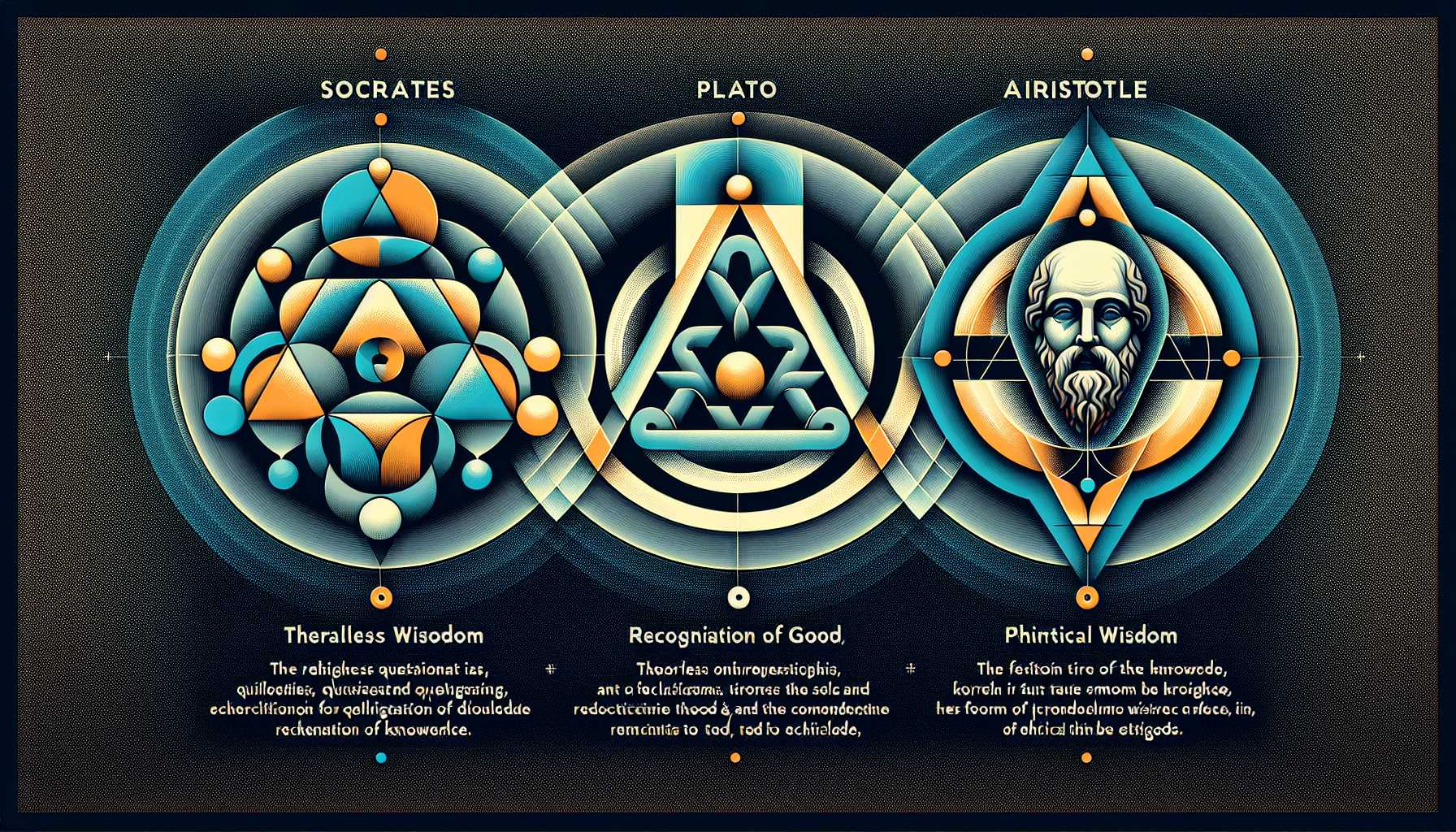
Wisdom Through the Ages Socrates Plato and Aristotles Insights
Socrates is characterized by his approach of relentless questioning and dialogue, emphasizing that true wisdom involves recognizing one’s own ignorance.
Sokuratesu wa, yōsha no nai shitsumon to taiwa no apurōchi ni yotte tokuchōdzukerare, shin no chie wa jibun jishin no michi o ninshiki suru koto o fukumu to kyōchō shiteimasu.
ソクラテスは、容赦のない質問と対話のアプローチによって特徴づけられ、真の知恵は自分自身の無知を認識することを含むと強調しています。
He viewed wisdom as a moral quality, deeply linked to how one lives and interacts with others, famously stating that 'the unexamined life is not worth living.'
Kare wa chie o dōtoku-tekina tokushitsu to minashi, tasha to no seikatsu ya sōgo sayō ni fukaku musubitsuite iru to kangae, chomei na kotoba to shite 'gumi sarete inai jinsei wa ikiru kachi ga nai' to nobemashita.
彼は知恵を道徳的な特質と見なし、他者との生活や相互作用に深く結びついていると考え、著名な言葉として「吟味されていない人生は生きる価値がない」と述べました。
Plato, a student of Socrates, elaborates on the notion of wisdom in his works, especially in 'The Republic,' where he describes the philosopher-king as the ideal ruler.
Sokuratesu no deshi de aru Puraton wa, kare no chosaku, toku ni 'Kyōwakoku' ni oite, chie no gainen ni tsuite jakuju shishi, tetsugakusha no ō o risō no shihaisha to shite egaiteimasu.
ソクラテスの弟子であるプラトンは、彼の著作、特に「共和国」において、知恵の概念について詳述し、哲学者の王を理想の支配者として描いています。
For Plato, wisdom is an understanding of the Forms, particularly the Form of the Good, and is essential for achieving justice and knowledge.
Puraton ni totte, chie wa keisō no rikai, tokuni zen no keisō no rikai de ari, seigi to chishiki o tassei suru tame ni fukaketsu desu.
プラトンにとって、知恵は形相の理解、特に善の形相の理解であり、正義と知識を達成するために不可欠です。
He believed that wisdom has a rational foundation and is connected to a higher truth that transcends the material world.
Kare wa, chie ni wa gōriteki na kiban ga ari, busshitsu sekai o koeru yori takai shinri ni musubitsuite iru to shinjiteimashita.
彼は、知恵には合理的な基盤があり、物質世界を超えるより高い真理に結びついていると信じていました。
Aristotle, Plato's student, provides a more practical view of wisdom, classifying it into two types: theoretical wisdom (sophia) and practical wisdom (phronesis).
Puraton no deshi de aru Arisutoteresu wa, chie ni tsuite yori jissen-tekina kenkai o teikyō shi, sore o riron-teki chie (Sofia) to jitsumutekina chie (Phronesis) no 2-tsu no taipu ni bunrui shiteimasu.
プラトンの弟子であるアリストテレスは、知恵についてより実践的な見解を提供し、それを理論的知恵(ソフィア)と実務的知恵(フロネーシス)の2つのタイプに分類しています。
He emphasizes that wisdom is not just about knowledge, but also about the ability to apply knowledge in practical situations.
Kare wa, chie wa chishiki dake de naku, jissai no jōkyō de chishiki o ōyō suru nōryoku ni mo kankei shite iru to kyōchō shiteimasu.
彼は、知恵は知識だけでなく、実際の状況で知識を応用する能力にも関係していると強調しています。
Aristotle sees wisdom as a virtue, closely tied to ethical behavior, suggesting that a wise person is one who makes sound judgments and decisions that lead to a good life.
Arisutoteresu wa chie o bitoku to minashi, rinriteki kōdō ni missetsu ni musubitsuite iru to mite ori, kenja to wa tadashii handan to kettei o kudashi, yoi seikatsu ni tsunagaru hito da to shisa shiteimasu.
アリストテレスは知恵を美徳と見なし、倫理的行動に密接に結びついていると見ており、賢者とは正しい判断と決定を下し、良い生活につながる人だと示唆しています。
Consequently, each philosopher offers unique insights into the nature of wisdom, reflecting their larger philosophical schools of thought.
Kekka to shite, kaku tetsugakusha wa chie no honshitsu ni tsuite dokuji no dōsatsu o teikyō shi, sorezore no yori ōkina tetsugakuteki shisō no ryūha o han'ei shiteimasu.
結果として、各哲学者は知恵の本質について独自の洞察を提供し、それぞれのより大きな哲学的思想の流派を反映しています。
Based on this article
